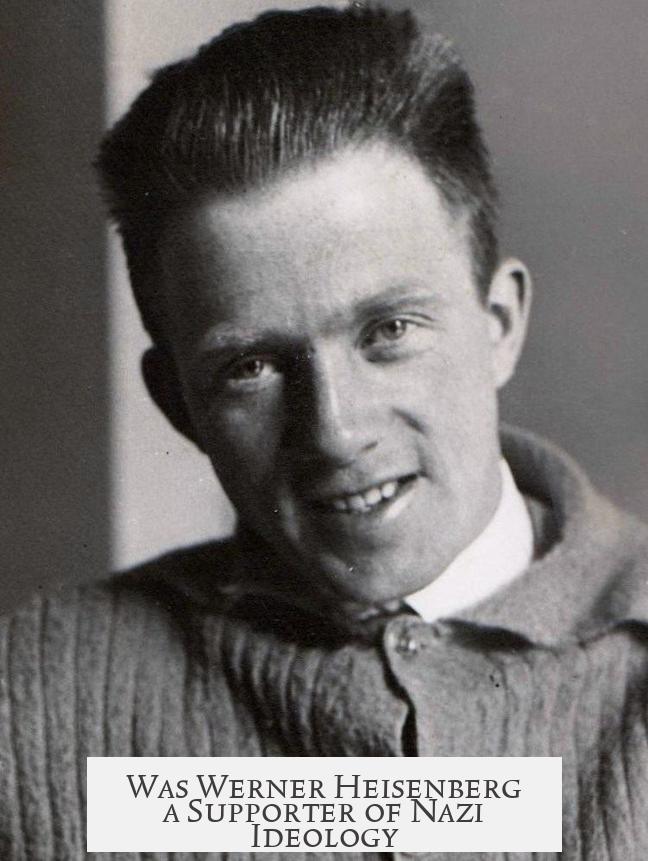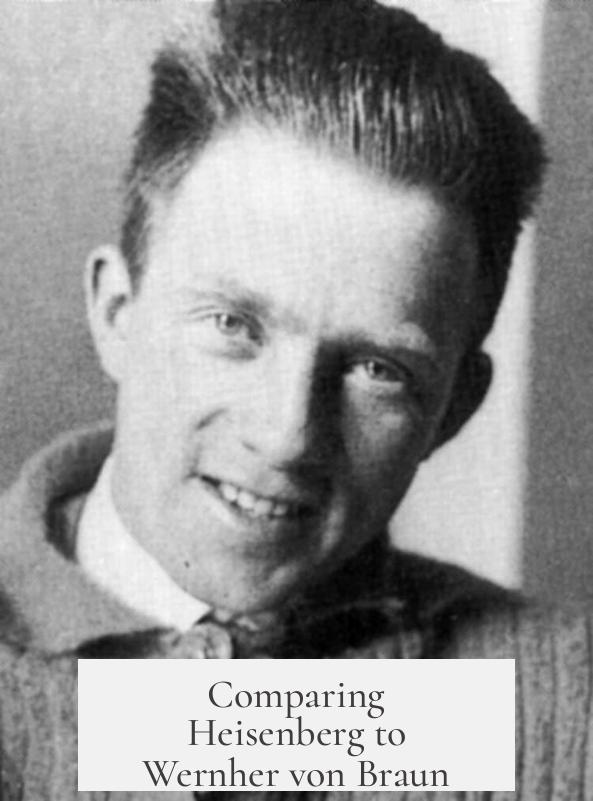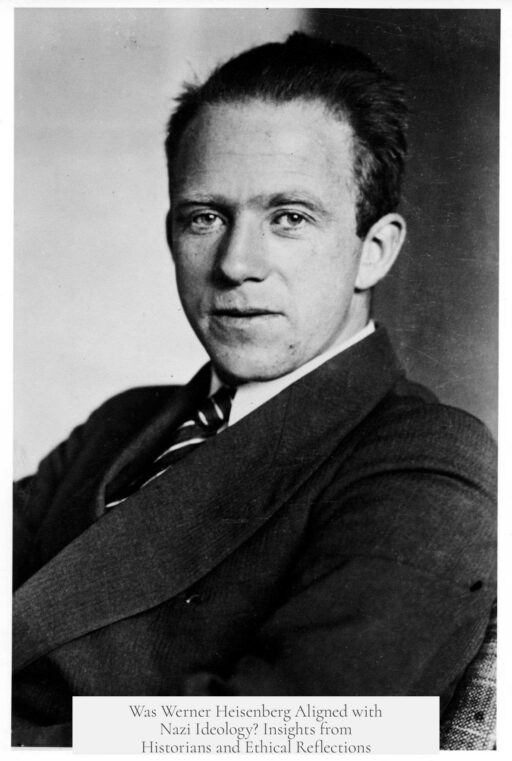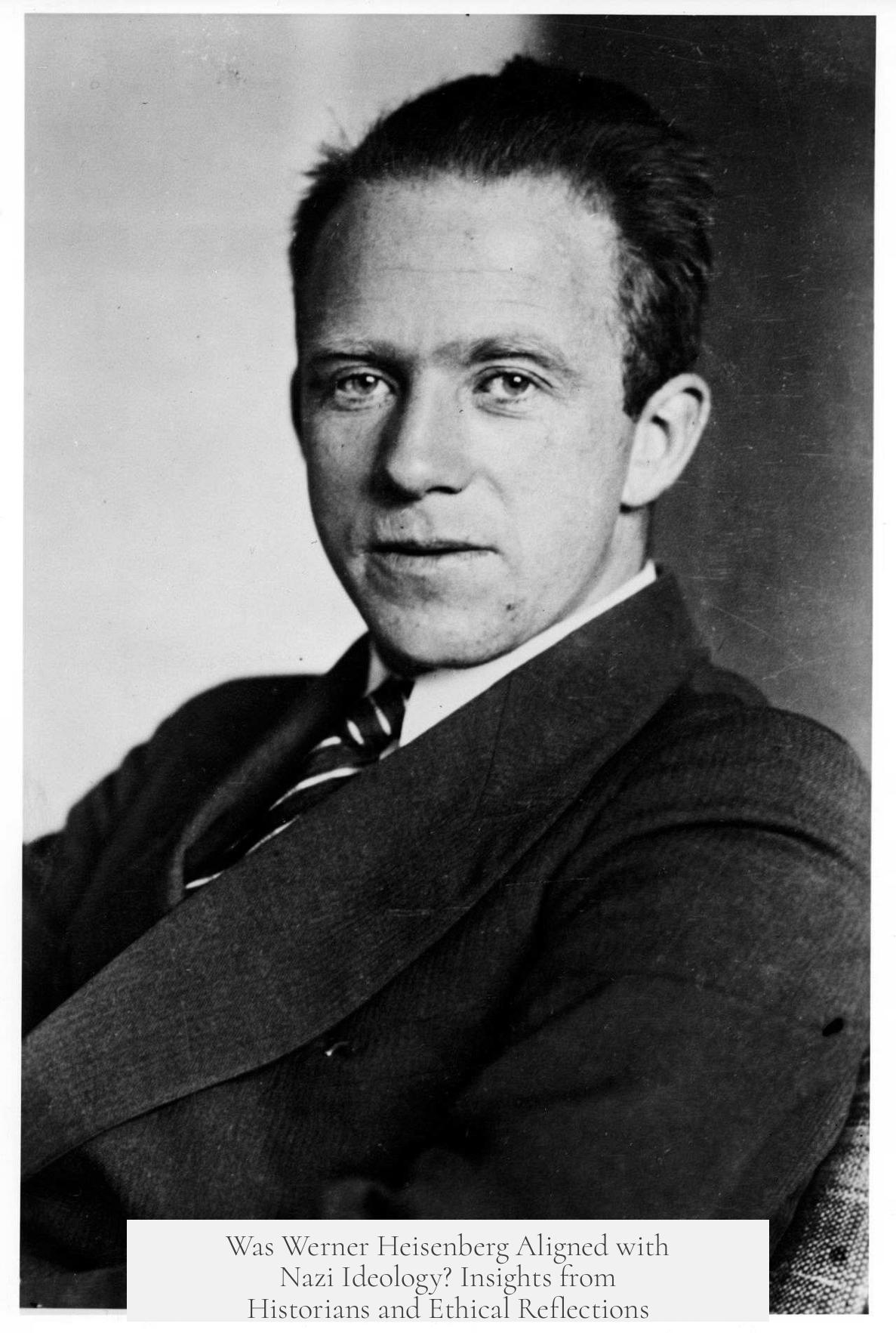Werner Heisenberg was not a straightforward supporter of Nazi ideology, but his relationship with the regime was complex and marked by collaboration rather than open endorsement. He did not join the Nazi Party or publicly advocate its racial or ideological doctrines. However, Heisenberg accepted and performed important scientific duties during the Third Reich, including leading nuclear research projects, while maintaining high scientific positions. His primary motivation appeared to be the preservation of German science amid turbulent political times, rather than an adherence to Nazi ideology.
Heisenberg remained a patriotic German who sought to protect the cultural and scientific traditions of Germany throughout Nazi rule. Despite personal disapproval of certain Nazi excesses, he did not openly oppose the regime. Instead, he fulfilled his roles, sometimes acting as a cultural ambassador promoting German science internationally under Nazi auspices. This behavior has led historians to debate his precise stance regarding Nazism.
Early historians and some contemporaries often placed Heisenberg in a category separate from clear resistors such as Max Planck and dissidents resisting Nazi ideals. While Planck expressed resentment toward the regime and attempted to undermine aspects of their control, Heisenberg’s level of compliance was higher, even if he refrained from embracing Nazi ideology fully. He also differs from committed Nazi supporters like Johannes Stark or from figures such as Wernher von Braun, who formally joined the Nazi party and the SS.
Later historians such as David Cassidy and Cathryn Carson generally assess Heisenberg more favorably. They argue that his cooperation stemmed from loyalty to Germany rather than sympathy for Nazi policies. Their research suggests he sought to preserve German scientific traditions without actively working to undermine the regime. No compelling evidence exists that Heisenberg tried to sabotage Nazi goals from within.
| Aspect | Heisenberg’s Position |
|---|---|
| Party membership | Never joined NSDAP |
| Role in Nazi regime | High scientific positions, nuclear research leader |
| Public opposition | None |
| Personal view | Disapproved excesses, sought cultural preservation |
| Postwar justification | Defended cooperation as patriotism |
Heisenberg himself explained his stance after the war by distinguishing passive opposition—emigration or withdrawal from responsibility—from his own approach. He regarded abandonment of Germany during the Nazi crisis as desertion and argued that survival of German science and culture required cooperation with the regime. This position attracted criticism, notably from Jewish colleagues and others who had experienced Nazi persecution directly. His postwar attempts to justify his cooperation are often viewed as weak and unconvincing.
Heisenberg was also a witness to Nazi ideological persecution and war aims. He knew about the regime’s racial policies and military ambitions but chose to stay engaged, allegedly to protect German science rather than to promote Nazi goals explicitly. This nuanced position—between active support and resistance—leaves his legacy ambiguous.
The comparison with Wernher von Braun highlights this ambiguity. Von Braun, who became a Nazi party member and SS honorary member, oversaw rocket programs using forced labor, clearly embedding himself in Nazi structures. Heisenberg avoided party membership and racial advocacy but nonetheless cooperated officially. He is thus placed in a gray zone between outright Nazis and dissenters.
The broader issue of determining culpability and collaboration with Nazism is complicated. The postwar denazification process struggled to clearly categorize many Germans who served under the regime without ideological commitment. Formal party membership is a straightforward indicator but insufficient to capture complex behaviors like Heisenberg’s. His case illustrates the challenges in judging scientists working under totalitarian regimes.
“For Heisenberg, passive opposition was tantamount to desertion.” — postwar interpretation of his stance
- Heisenberg never joined the Nazi Party.
- He held prominent scientific roles during Nazi Germany.
- He aimed to preserve German science rather than promote Nazi ideology.
- He did not openly oppose Nazi policies or practices.
- His cooperation remains controversial among historians.
- Postwar explanations of his actions are often seen as inadequate.
For further exploration of Heisenberg’s role during the Nazi era, key texts include David Cassidy’s Beyond Uncertainty, Cathryn Carson’s Heisenberg in the Atomic Age, and Walker’s Nazi Science. These works provide detailed analysis of Heisenberg’s moral positioning and scientific work under Nazism.
Was Werner Heisenberg a Supporter of Nazi Ideology?

Werner Heisenberg was not a supporter of Nazi ideology in the strict sense but worked within the Nazi regime largely out of patriotism and a desire to preserve German science during a tumultuous era. His relationship with Nazism defies simple categorization. To unravel the complex web around Heisenberg’s stance, let’s dig in, balancing the facts and exploring the nuances.
Most people know Heisenberg as a towering figure in physics, famous for the Uncertainty Principle. But his role during the Third Reich? It’s a bit murky. He did not sign up for the Nazi Party. Yet, he held significant scientific roles throughout Nazi Germany, performing duties expected of him without resistance. Why? Because he was deeply patriotic and believed in preserving what he saw as the “cultural heart” of German science—even if that heart beat within an ugly political regime.
Imagine being a scientist during a time when politics and morality collided like tectonic plates. Heisenberg chose to stay in Germany and work on projects, including nuclear research, during periods when he thought Germany might win the war. He even acted as a cultural ambassador, representing German science in neutral and occupied countries, indirectly promoting the regime.
So Was He A Nazi? The Historians Weigh In
Early voices, like physicist Gerald Holton and some of Heisenberg’s contemporaries, paint him as close to the Nazi fold, though not ideologically invested in Nazism’s racial doctrines. They place him somewhere between reluctant collaborators like Max Planck—who resisted where he could—and outright Nazi fanatics like Johannes Stark.
Later historians, including David Cassidy and Cathryn Carson, lean toward a softer interpretation. Their view? Heisenberg was driven by love of Germany, not by Nazi ideals. These scholars point out no clear evidence exists showing Heisenberg tried to sabotage the regime from within. Instead, he sought to keep German science alive, fearing total cultural destruction if he withdrew.
It’s a fascinating distinction: loyalty to country versus loyalty to a toxic ideology. Heisenberg embodied the former, at the moral and ethical complexity of the latter.
Heisenberg’s Moral Compass—or What’s Left of It
On a personal level, Heisenberg reportedly disliked the excesses he saw under Nazi control. He defended science and his colleagues as restrictions tightened. He knew of the regime’s racial persecution and war aims. Some critiques say his responses were weak or insensitive, draped in a layer of denial.
After the war, he faced harsh questions, especially from Jewish peers in physics, about his wartime role. His explanations leaned heavily on a concept of “passive opposition” being equivalent to desertion. For him, those who emigrated or withdrew from public life to avoid complicity abandoned their country and its people.
In his words, staying meant cooperating. It was a choice: opposition from the outside or responsibility from within. This stance opened him to accusations of collaboration—complex and painful accusations weighing on many intellectuals who faced Nazism.
Comparing Heisenberg to Wernher von Braun

What’s intriguing is comparing Heisenberg with Wernher von Braun, the rocket engineer. Von Braun officially claimed apolitical motives, yet he joined the Nazi Party and the SS, overseeing programs using concentration camp labor. Most see von Braun as clearly complicit and committed. Heisenberg, by contrast, did not join Nazi organizations and never openly promoted Nazi ideology.
But exactly how “less Nazi” was Heisenberg? There’s no simple answer. While von Braun’s allegiances and moral compromises were obvious, Heisenberg’s situation was more tangled in loyalties and survival, but he still chose cooperation over resistance.
The Tricky Question of Culpability
The “denazification” process post-WWII tried to purge those involved with Nazism. Sorting out degrees of guilt was messy and inconsistent. Being a Nazi went beyond signing up for the party; it involved moral and practical cooperation with evil. For many intellectuals, including Heisenberg, the waters were extremely murky.
Heisenberg’s case showcases the difficulty of defining what counts as “support.” Does working under a regime equate to endorsing it? Or does it mean trying to keep cultural and scientific progress alive despite the regime’s dark shadows?
What Can We Learn From Heisenberg’s Story?
This story warns us about the dangers of easy labels. People’s choices in tough historical moments aren’t black or white but olive and gray. Heisenberg’s example is a reminder that patriotism can conflict with morality, and survival sometimes demands impossible decisions.
Heisenberg’s work preserved German science legacy but also left questions about the costs of silence and cooperation. His postwar attempts to justify himself teach us that history not only judges actions but the courage to face them honestly.
Next time someone asks, “Was Werner Heisenberg a Nazi?” the answer is complex. He was a patriot who cooperated with Nazis without sharing their ideology fully. He didn’t actively resist, but neither was he a wholehearted supporter. Instead, he tried to walk a moral tightrope over a pit of horrors, sometimes stumbling.
For Those Curious To Dig Deeper
- Beyond Uncertainty by David Cassidy explores Heisenberg’s scientific genius and troubled wartime role (see pages 220-221 for key insights).
- Nazi Science by Walker richly outlines how scientists like Heisenberg operated within the Third Reich.
- Cathryn Carson’s Heisenberg in the Atomic Age provides a nuanced narrative of his life and moral challenges.
- Also, Cassidy’s Uncertainty offers broader context on the ethical dilemmas scientists faced under Nazism.
If you want to wrestle with the question of science, morality, and politics, Heisenberg’s story offers a knotty, human answer. It’s not about pure heroes or villains—more about people caught in impossible times.




